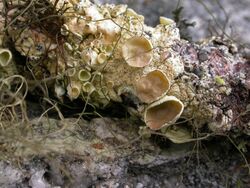Biology:Ahtiana
| Ahtiana | |
|---|---|

| |
| Ahtiana sphaerosporella growing on whitebark pine (Pinus albicaulis) in Whistler, British Columbia, Canada | |
| Scientific classification | |
| Domain: | Eukaryota |
| Kingdom: | Fungi |
| Division: | Ascomycota |
| Class: | Lecanoromycetes |
| Order: | Lecanorales |
| Family: | Parmeliaceae |
| Genus: | Ahtiana Goward (1986) |
| Species: | A. sphaerosporella
|
| Binomial name | |
| Ahtiana sphaerosporella (Müll.Arg.) Goward (1986)
| |
| Synonyms | |
| |
Ahtiana is a genus of lichenized fungi known as candlewax lichens in the family Parmeliaceae.[1] A monotypic genus, it contains the single species Ahtiana sphaerosporella or the mountain candlewax lichen,[2] found in western North America. This species was segregated from the genus Parmelia by Canadian lichenologist Trevor Goward in a 1985 publication.[3] It had been suggested that the genus include A. aurescens (Eastern candlewax lichen,[2] formerly Cetraria aurescens Tuck.) and A. pallidula (pallid candlewax lichen,[2] formerly Cetraria pallidula Tuck.) based on similarities in morphology,[4] but this transfer is not supported by molecular analysis.[5]
The genus was named in honour of Finnish botanist Teuvo Tapio Ahti.[3]
References
- ↑ "Outline of Ascomycota – 2007". Myconet (Chicago, USA: The Field Museum, Department of Botany) 13: 1–58. December 2007. Archived from the original on 2009-03-18. https://web.archive.org/web/20090318003134/http://www.fieldmuseum.org/myconet/outline.asp.
- ↑ Jump up to: 2.0 2.1 2.2 "Standardized Common Names for Wild Species in Canada". 2020. https://www.wildspecies.ca.
- ↑ Jump up to: 3.0 3.1 Goward T. (1985). "Ahtiana, a new lichen genus in the Parmeliaceae". Bryologist 88 (4): 367–71. doi:10.2307/3242678.
- ↑ "A revision of the North American lichen genus Ahtiana (Parmeliaceae)". Bryologist 98 (4): 596–605. 1995. doi:10.2307/3243591.
- ↑ "Phylogeny of the cetrarioid core (Parmeliaceae) based on five genetic markers". Lichenologist 41 (5): 489–511. 2009. doi:10.1017/S0024282909990090.
Wikidata ☰ Q4696386 entry
 |

